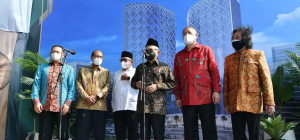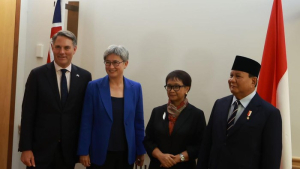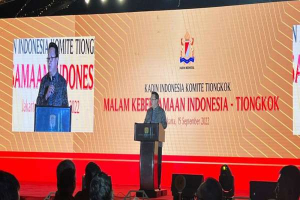Indonesia, Malaysia team up to fight palm oil discrimination, solve issue on migrant workers
President Joko "Jokowi" Widodo met with the newly elect Malaysian Prime Minister Anwar Ibrahim at the Bogor Presidential Palace on January 9, 2023, to discuss on, among others, the palm oil industry in both countries and Indonesia's migrant workers.
“We agreed to strengthen cooperation through the Council of Palm Oil Producing Countries (CPOPC) to increase the palm oil market and fight palm oil discrimination,” Jokowi told a joint press conference. In 2021, Indonesia produced 46 million tons of crude palm oil, making it the world’s largest palm-oil producer, scmp.com reported. Malaysia tailed behind with 18 million tons. The two countries sent their palm oil products, mostly used for biofuels, worth US$ 6.4 billion to the European Union (EU).
It was Ibrahim's first overseas trip after winning the election and being sworn in as Malaysia's 10th prime minister on November 24, 2022. Having Indonesia as his first destination meant a lot to Ibrahim, who had a political persecution at home for around two decades. During his political fight from prison, Ibrahim received supports from his Indonesian friends.
Indonesia holds the Association of Southeast Asian Nations (ASEAN) chairmanship this year and will need supports from Malaysia on several regional issues, especially the Myanmar's oppression on Rohingya people.
Five bilateral key points
There are five key points that Jokowi and Ibrahim emphasized on the meeting:
- The protection of Indonesian migrant workers.
- Agreements on the Sebatik land border, Sinapad Sesai land border, as well as maritime borders in the Sulawesi Sea and the Malacca Strait that will be signed this year.
- Strengthening the cooperation between Indonesia and Malaysia to improve markets and fight discrimination against palm oil.
- Appreciation for Malaysia's support for the Indonesia-Singapore Flight Information Region (FIR) Agreement.
- Strengthening ASEAN cooperation while at the same time increasing ASEAN's role in the Indo-Pacific region.
Eight Malaysian companies had also signed MoUs with Indonesian firms worth up to 1.66 billion Malaysian ringgit (US$ 379 million), Malaysia's Foreign Ministry said in a statement.
Palm oil and Indonesia migrant workers
- On March 31, 2022, Malaysia and Indonesia signed an MoU on the recruitment and protection of Indonesian domestic helpers in the neighboring country. The MoU was aimed at ensuring that all recruitment processes and protection mechanisms for Indonesian domestic helpers are implemented in a comprehensive manner by relevant parties, in accordance with the policies and laws of both countries. However, Indonesia temporarily halted sending workers to Malaysia in August 2022. The termination was due to the failure to carry out the MoU regarding migrant workers. The government agreed to sent Indonesian migrant workers (PMI) to Malaysia by creating the One Channel System (OCS) to protect the workers.
- Indonesia and Malaysia agreed to work together to ”fight discrimination against palm oil” and “strengthen cooperation through the Council of Palm Oil Producing Countries”. It was a response to the EU's proposal in removing the use of palm oil in biofuel production by 2030. If the proposal was accepted, there would be economic down fall.
New capital Nusantara development
Jokowi and Ibrahim said in a joint press statement that they were happy to see the interest of Malaysian investors in the development of Indonesia's new capital (IKN) Nusantara. There are 10 Malaysian companies - which focus on electronics, healthcare, waste management, construction and property - that will serve as investors.
In addition, there are also MoUs in the field of shipping, export and import financing, green energy and the development of battery industry.
Already have an account? Sign In
-
Start reading
Freemium
-
Monthly Subscription
30% OFF$26.03
$37.19/MonthCancel anytime
This offer is open to all new subscribers!
Subscribe now -
Yearly Subscription
33% OFF$228.13
$340.5/YearCancel anytime
This offer is open to all new subscribers!
Subscribe now






